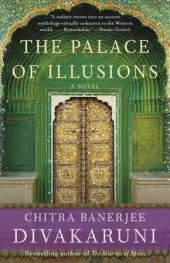 Recently I was invited to a book club to discuss my latest novel, The Palace of Illusions. I accepted happily. I love book clubs. Unlike bookstore talks where you are introducing a new book to people unfamiliar with it, the members of a reading group have generally gone through a book carefully. Of course, this means you have to be prepared for in-depth questioning. ("The color red appears 41 times in this novel, but it doesn't always mean the same thing. What exactly did you want it to symbolize, and why?") But it also means they liked the book, otherwise they wouldn't have invited you. Plus there's usually food. Good food.
Recently I was invited to a book club to discuss my latest novel, The Palace of Illusions. I accepted happily. I love book clubs. Unlike bookstore talks where you are introducing a new book to people unfamiliar with it, the members of a reading group have generally gone through a book carefully. Of course, this means you have to be prepared for in-depth questioning. ("The color red appears 41 times in this novel, but it doesn't always mean the same thing. What exactly did you want it to symbolize, and why?") But it also means they liked the book, otherwise they wouldn't have invited you. Plus there's usually food. Good food.After we had all helped ourselves to samosas and chutney (yes, when they read my books, clubs often decide to go for Indian food), one of the members said, "This book is not at all like your other work. What made you write something so different?"
Another member added, "Was it difficult to do? Were you nervous?"
Let me answer the second query first. Yes, I was nervous. So were my agent, my publisher and my husband! We were, however, each nervous for a different reason.
My agent reminded me that readers have come to expect a certain kind of book from me. Novels such as The Mistress of Spices or Sister of My Heart are tales of protagonists who find themselves challenged by a new world order. They focus on the transformations catalyzed by immigration, and they are all set in contemporary India or the United States. Now I wanted to write a novel which would be a re-telling of a complicated Indian epic set 5,000 years ago.
My publisher was concerned that not as many people would be interested in the subject matter, the saga of the feud between two princely families, ending in a devastating war.
My husband was worried because the original epic on which my novel would be based, the Mahabharat, is considered one of our sacred texts, and many Indians might be less than happy if I changed anything. (And if I didn't, what was the point of writing the novel, then?)
I was anxious because I knew that I was setting myself a big writing challenge. I would be moving out of my comfort zone in trying to bring alive a completely different world. For the first time, I would be focusing on the terrible cost of war. And yes, it would be difficult.
But this discomfort was crucial if I wanted to grow as a writer. Unless I pushed myself into trying something new, I knew, sooner or later, I would stagnate. My writing would become formulaic and repetitive. I took on the challenge of The Palace of Illusions to prevent that.
I knew I would have to do a whole lot of research about this world, analyzing the original text and reading novels which had already been written about the Mahabharat. I'd have to discover the lifestyle of the period: the kinds of houses in which the rich lived --- and the poor. What people ate and drank. The kind of underclothing (this becomes very important in the story!) that women wore.
I wanted to learn how to be respectful of an original text and yet create an exciting human adventure, with enough twists to perk up even those who were familiar.
And I wanted to shift the focus from the warriors to the women --- wives, mothers, sweethearts --- who lived on the edges of the manuscript, because I believe the lives of women are important.
How was I going to do it?
I think what saved me was my heroine: the Princess Panchaali, who became the narrator of the story.
Princess Panchaali has the distinction of being unique in Indian literature for being married to five men --- five brothers, at that --- all at the same time. Her domestic arrangements, as you might imagine, are somewhat complicated!
Soon after I decided that I would begin my book with her birth and end it at her death, she took over the telling of the story, as characters sometimes do when we are fortunate. She spoke in a clear, strong voice, arguing and cajoling and complaining and inspiring (and sometimes bullying) the people around her. As she went from being the most powerful queen in the land to a servant maid, as she plotted a terrible revenge, she revealed to me her fetishes and fears --- and the forbidden love that would dog her all her life. She delighted in breaking barriers and rules --- and gave me the courage to do the same. She reminded me that literature could be magical: If a writer managed to bring a character to vibrant life, a reader could reach across the chasms of time and culture, no matter how immense they were, to clasp her hand.
Did I succeed in doing that? You'll have to let me know.
---Chitra Banerjee Divakaruni
Readers can leave comments about Divakaruni's works on her Facebook wall.






